- Home
- Todd Strasser
Price of Duty Page 2
Price of Duty Read online
Page 2
Now, in the privacy of the Mercedes, Lori wants to see my hand, which, luckily, is still attached to my body.
I drape my left arm over the seat. My hand is missing the pinkie and the distal phalanx of the ring finger. I hear a loud sniff. Lori starts to cry. I look back and my eyes meet Dad’s. I wonder if he’s thinking what I’m thinking. Losing a finger is nothing compared to what others have lost. I’d give my whole left arm if it meant Morpiss could get back half of what he’s lost.
And Skitballs.
And Clay.
For what?
“You okay?” Dad asks.
“Of course he’s okay,” the General says. “He’s a goddamn war hero.”
THE GENERAL
The General was a corporal in Vietnam. His squad was ambushed in the jungle and the squad leader killed. My grandfather took command, broke the team in two, and ordered a fire-and-maneuver retreat to a point where they hoped to link up with reinforcements. The skirmish was fierce and, at times, hand-to-hand. Despite being wounded in the shoulder and arm, my grandfather never quit. After the squad linked up with the reinforcements and turned the retreat into an assault, he kept fighting and refused medical treatment until it was over.
They awarded him the Bronze Star. I wonder if he felt as weird about what happened then as I feel now. No, not a chance. He’s always been gung-ho.
Guess I was like that once.
Not anymore.
The Army brass is still in the process of deciding what level of valor medal I’ll be awarded. I’ve heard that they’re considering me for the Silver Star. One step up from the bronze, one level higher than the General’s.
Would I dare refuse it?
* * *
On the way home from the airport the signs in front of the fast-food places, the car wash, and the elementary school all say, WELCOME HOME, JAKE LIDDELL, OUR HERO.
At our house a silver-gray Jeep Wrangler in the driveway sparkles in the sunlight. I haven’t heard anything about Dad or Lori getting a new car. The garage doors are open and inside are Dad’s Cherokee and Lori’s Honda.
The Mercedes stops behind the Wrangler. The Jeep’s tail reflectors have that new-car shimmer.
No one gets out. I feel the General’s hand clap my shoulder from behind. “You’ve earned it, son.”
Is he serious?
We pile out. The Jeep’s got that straight-from-the-showroom smell. I’m overwhelmed. From the time Lori and I were little, Dad made it clear that we weren’t one of those families where the kids got everything they wanted. Some kids in our neighborhood were given cars as soon as they were old enough to drive. We were given advice on how to find a good used vehicle that we could afford with our savings.
“You don’t have to do this, sir,” I tell the General. I’d hug him, but he hates being hugged almost as much as he hates being called “Grandpa.” So instead I endure another one of his bone-crushing handshakes.
“You deserve it,” he says. “You’re a real military man now.”
It’s no accident that he says this in front of my father, who, through no fault of his own, has spent his military career as a PowerPoint Ranger. Dad’s a lieutenant colonel at the base here in Franklin, and the General never misses an opportunity to remind him that all he’s ever been is a desk jockey. He’s never gone to war; never tasted battle the way “real” soldiers do.
The General checks his watch. “I’ll let you get some R and R.” He heads back to the Mercedes, where his driver is holding the door. And then he’s gone.
Dad, Lori, and I stay in the driveway with the new Jeep. It’s completely unnecessary . . . and if I work up the guts to do what I believe I should do, I won’t be the only one who feels that way. Sure hope the General kept the receipt.
I glance at Lori. She’s two years older than me, so we’ve always had a brother/sister competition over who got what. But when my eyes meet hers, there’s not a trace of resentment.
“You do deserve it,” she says.
For a moment, I can’t hold her gaze, and have to look away. When our eyes meet again, she’s frowning as if she can sense that something’s wrong.
“All right.” Dad claps his hands. “Let’s get you inside and settled.”
Blue greets me at the front door with tentative sniffs. I rub his head and he wags his tail a little, but it’s not the wag I’d get if he remembered me.
“He’s so old.” Lori tries to soften the blow. “All he does is sleep.”
Blue’s all gray around the muzzle, and he has those lumps under his coat that some old dogs get. He finishes sniffing and wanders slowly and stiffly off. I feel a pang. Not because he’s gotten so old. But because seeing him reminds me of something else they don’t show you in the ads for today’s Army—how, over there, we had standing orders to shoot Blue’s canine relatives on sight.
There were packs of wild dogs everywhere. Bony, mangy, terrible-looking creatures. And because we were not just there to fight an enemy, but to gain the trust of the local population, we were ordered to kill them.
Why? To show respect. To prove to the locals that we cared.
You only had to witness once what those starving dogs did to the bodies of the dead. Then you’d understand.
* * *
“What’s this?” I’m standing in the doorway to the den. The chairs and couch have been pushed aside and a hospital bed dominates the room.
“We weren’t sure how you’d do with the steps,” Dad says.
On the floor are two large plastic United States Postal Service mail crates filled with letters and cards.
“Someone published our address on the internet,” Lori explains.
A manila envelope lies on the hospital bed. It’s got no address or stamp. I open it. Inside are a dozen sheets of paper with names and phone numbers.
“And our phone number,” Lori says. “These are the people who called.”
I can’t believe what I’m looking at. It’s a spreadsheet that goes on for pages and pages. Hundreds of names and numbers. “You compiled this?”
“The message box kept filling up,” she says. “So I’d transfer the names and numbers and empty it.”
She didn’t have to do that, but she knows it’s what Mom would have done. Not returning calls is bad manners. Ever since Mom died of cancer six years ago, Lori’s been half mother and half sister, and one of the few people I can talk to about practically everything.
Dad has to make a call and when Blue barks, Lori takes him out to the backyard. I’m left in the den. Getting this hospital bed was a thoughtful gesture, but there’s no way I’m going to stay down here and be a spectacle everyone sees when they come and go. So I head for my room. Climbing the stairs in a full-leg cast isn’t easy. If the handrail isn’t securely anchored, you can accidentally pull it off the wall. That happened a few days ago outside the green room at a television station in New York City. Part of the rail came right out of the drywall. Fortunately, a production assistant caught me before I did a face-plant.
But this house is old and well built. The stairway rail is solidly anchored. I hobble up the steps.
My room hasn’t changed. Same posters and furniture. Same books and dumb trophies you get in sports just for showing up. The only thing that’s different is the person who’ll sleep here tonight.
I take out my phone and text Erin Rose: Home. Need 2 C U. Important. Hit me back, K?
I emailed her while I was over there. She didn’t email back. I sent texts. She didn’t answer. There are things she needs to know about Brad. Things I’ve absolutely promised myself to tell her face-to-face.
I toss the phone on the bed, slide my hands under the cast, and heave it up so I can lie down. Stare at the spidery cracks in the ceiling.
The last time I lay on this bed and stared at those cracks was early on the morning that I entered the Army. A little more than a year ago. Outside, the sun was still low and orange behind the trees. I lay here trying to will myself to go back to sleep, knowing I
had a long day ahead. I’d only gone to bed a few hours earlier. But I was wide-awake. Couldn’t wait until it was time to go. Couldn’t wait to get on that bus to Fort Benning. I knew boot camp was going to be tough, but I’d gotten a head start on the Army Physical Fitness Test. I’d been doing the pyramid workout, cutting back on calories, trying, not very successfully, to change my sleep schedule.
When my phone chimed that morning, I figured it was Aurora getting an early start on our last few hours together. But the voice on the other end of the line was from Mortuary Affairs, asking if I wanted to be buried or cremated? Did I know the name and location of the cemetery? What type of headstone? What scripture? What personal effects did I want to be buried with? Did I have a preference for the music that would be played?
I remember thinking that it was about the worst welcome imaginable to the armed forces. Now I think it’s just the military’s way of preparing you for what you’re going to spend practically every day of your deployment thinking about.
Now here I am again, a year later, on this bed. I’m glad to be home with my family and Aurora, glad to be in a place where enemy rockets don’t come screaming in day and night. But I miss my buddies. I miss the weighty reassurance of my rifle on my lap, miss the friendship, the joshing and joking, and even the shared terror. The camaraderie. Morpiss, Skitballs, Magnet, Clay.
Brad . . .
BRAD
Out in the dark, someone was going bonkers on a drum kit. It was my first night at Forward Operating Base Choke Point and the last thing I imagined hearing. I was walking around after dinner, trying to get a feel for the place. The FOB was surrounded by a HESCO barrier, a wall of dirt maybe six feet thick. Beyond that were sand berms and razor wire. Not much was going to get through on foot. Inside the FOB were barracks, the DFAC (dining facility), PX (base store where you could buy candy, cigarettes, and Rip It), and assorted offices and storage in Conex boxes. In the far north corner of the FOB were vehicle sanitation and the boneyard where “blowed-up” vehicles were towed. I would soon learn that no one at the FOB ever said “blown-up.”
It was near the boneyard that I discovered the square of sandbags, rising up about six feet on all sides. The space inside must have been just large enough for a drum set. For a moment I wondered if it was a PSYOP thing. I’d heard that Army psychological operations liked to blast enemy combatants with heavy metal music like “Back in Black” and “Enter Sandman.” It was said that doing so drove the enemy crazy and provoked spontaneous, and usually suicidal, one-man attacks.
But what I was hearing that night was just loud manic drumming without accompaniment. I found the opening and looked in. There was Brad. Shirt off, body glistening with sweat in the moonlight. Going gaga on the skins. And the funny thing was, even though it was dark, I knew it was him. Because I’d heard him play back home.
I watched and listened. When he gave no indication of letting up, I stepped in front of the bass drum, feeling the sonic booms. . . . It might just as well have been blasts of artillery. Brad kept pounding like a man possessed. For a few moments, he still didn’t see me.
Then he did.
He stopped. He blinked as if he thought his eyes must have been playing tricks on him. Breathing hard, he wiped the sweat off his face with a T-shirt. Finally, he snorted. “What are the odds?”
Brad was from Franklin. We’d gone to the same high school.
We’d been in love with the same girl.
* * *
Her name was Erin Rose. She and I started going together in sixth grade. What did we know about relationships? Well, maybe Erin Rose knew something, but I sure didn’t. With a smirk, Lori called it “puppy love.”
By eighth grade, Erin Rose was a knockout. She’d matured early the way some girls do. People were always telling her to enter beauty contests, but she thought they were stupid. Every guy I knew was jealous of me.
Brad was a junior. He drove a Vette and played drums with the Zombie Horde, a local heavy metal band that didn’t mind turning down the volume to play at weddings and school dances. Sometime during the spring of eighth grade, Erin Rose caught his eye. Looking back now, it’s obvious that I didn’t stand a chance. But at the time I was heartbroken.
Brad and Erin Rose got serious really fast. By the time he enlisted after graduation, Erin Rose (then going into tenth grade) was pregnant. Brad had done four years of JROTC at Franklin High and entered basic training as an E-3, which meant better pay than someone who walked in off the street and signed up. It also meant that if he did four years in the service, he’d be eligible for a college scholarship, even though the only college that would have interested Brad was the University of Heavy Metal.
The day before he went into the Army, he gave Erin Rose an engagement ring. Their daughter, Amber, was born at the end of sophomore year. Since Franklin High provides daycare, Erin Rose came back for junior year. Brad was home from his first deployment by then. Sometimes I’d see him drop Erin Rose and Amber at school in the morning.
At the end of Erin Rose’s and my junior year, Brad redeployed. I heard rumors that Erin Rose was furious about him leaving Amber. Then, sometime during our senior year, she and I patched things up and became friends. I guess part of the reason was that we’d shared so much in middle school. Another part was probably whatever had attracted us to each other in the first place. But when Brad found out we were hanging around, he became crazy jealous. I guess it was understandable. He was on his second deployment, over there where the only available females were camels and goats.
The truth was, he had nothing to worry about. Erin Rose wasn’t that kind of girl, and by then I’d started dating Aurora. But Brad couldn’t relax about it. I guess a little part of me enjoyed knowing it drove him crazy. Like it was revenge.
And now here we were, assigned to the same FOB thousands of miles from home. Like Brad said, what were the odds?
He flipped a drumstick up into the dark night air and caught it. “So, Private, may I ask what Windy Granger’s grandson is doing in this hellhole?”
“Signed up, sir.”
“I think you mean, Staff Sergeant Burrows,” Brad corrected me. “I work for a living.”
I snapped to attention. “Staff Sergeant Burrows, sorry.”
“At ease, Private.” He frowned. “You enlisted? Why?”
“I didn’t want to take the easy route, Staff Sergeant.”
When he grinned, his teeth were white in the moonlight. “Man, you are even stupider than I thought.”
It was my first night at the FOB. The first time I’d seen Brad in years. This wasn’t the time or place to go into an in-depth explanation for why I’d enlisted. Anyway, at that moment I had a much more pressing concern. “May I ask a favor, Staff Sergeant?”
“Go ahead, Private.”
“Staff Sergeant, I truly hope that no one will find out about the General. I worry that it would really mess things up for me here.”
Sitting behind the drum kit, Brad twirled a stick around his finger. I couldn’t think of a good reason why he should have granted my request. It wasn’t like I was going to add, “It’s the least you can do, considering you stole my girlfriend.” But I was worried that if word got out about who my grandfather was, my sorry grunt butt would be razzed raw for my entire deployment.
Brad knew he had me by the nuts, at least for the next eight to twelve months. He tilted his head back and looked up into the black, star-speckled sky. Then he started to bash the skins again.
ALJAHIM
Jake! I’m hit!” Skitballs is screaming.
I’ve tucked myself into the twisted wreckage of the Humvee, where I’m protected by the truck’s body and an open door. Bullets are whizzing and snapping everywhere. From the searing hot burning points in my legs, back, and left arm, I know I’ve taken a lot of shrapnel. The pain is bad, but not immobilizing.
Up and down the road are thick black plumes of smoke. The IEDs that blew up our convoy must have been daisy-chained. A hundred yards
of bombs had gone off just when the convoy was directly over them. The insurgents were already dug in and waiting to pick off any of our guys who were lucky enough to survive the blasts.
“Jake!” Skitballs screams again. Other than a general direction, I can’t figure out where he is. Can’t lift my head to look for him without getting it blown off. But wherever he is, it’s a cinch he’s out of the line of enemy fire. Otherwise, he’d have been smoked by now.
“Clay! Magnet!” I call out to the other guys.
Shots rip through the air. The firefight is kinetic. Gunfire feels like it’s coming from all directions. Whoever is shooting on our side is keeping the insurgents from getting closer. The most intense fire is coming from my right, from behind a pockmarked wall with vaulted openings that line the road.
“Oh lord, Jake!” Skitballs screams.
“Clay! Magnet!” I shout as loud as I can. No answer. Crude animal logic kicks in. I can’t get to Skitballs as long as the enemy is firing from behind that wall. So I have to eliminate them first. I throw a flashbang over the wall, then jump up and hustle through the closest opening. The pain from my wounds slows me, but I’m totally juiced on adrenaline. There are two shooters in the small courtyard where I threw the flashbang. One is curled on his side, his eyes squeezed shut and his hands over his ears. The other one is on his hands and knees, blinking as he gropes for the AK on the dusty ground a few feet away.
I shoot him first, then aim at the other guy. Do you shoot a defenseless man lying curled on the ground? A few seconds ago he’d been trying to kill me. And in a few moments from now, when he’s reoriented, he’ll want to try again.
I pull the trigger. In boot camp, they teach you about the Geneva Conventions and the proper conduct of combat under the code of military war. None of that means doodly-squat when it’s either you or him. Right now anyone who’s still alive from our convoy isn’t fighting for America. We’re not making a stand for democracy or freedom. We’re just a bunch of scared nineteen- and twenty-year-olds doing whatever we can to stay alive.

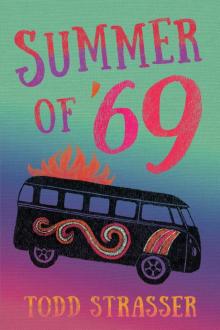 Summer of '69
Summer of '69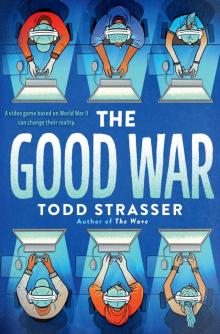 The Good War
The Good War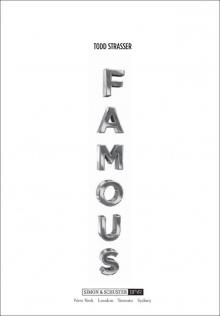 Famous
Famous If I Grow Up
If I Grow Up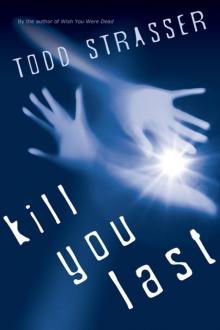 Kill You Last
Kill You Last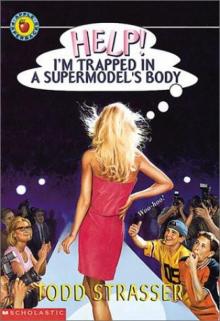 Help! I'm Trapped in a Supermodel's Body
Help! I'm Trapped in a Supermodel's Body Price of Duty
Price of Duty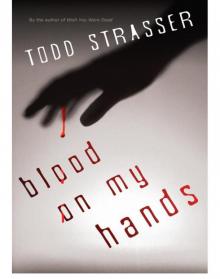 Blood on My Hands
Blood on My Hands Help! I'm Trapped in My Sister's Body
Help! I'm Trapped in My Sister's Body sidewayz glory
sidewayz glory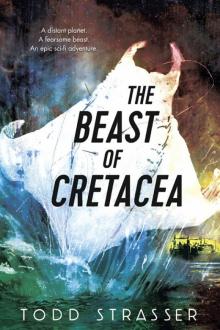 The Beast of Cretacea
The Beast of Cretacea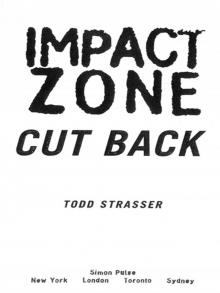 Cut Back
Cut Back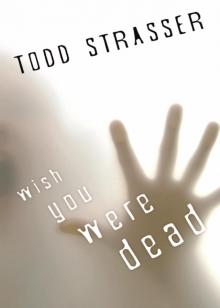 Wish You Were Dead
Wish You Were Dead The Wave
The Wave Home Alone 3
Home Alone 3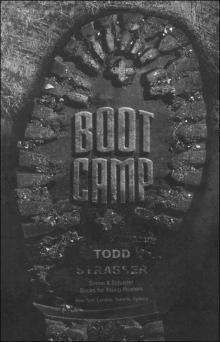 Boot Camp
Boot Camp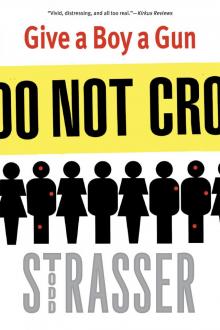 Give a Boy a Gun
Give a Boy a Gun Home Alone 2
Home Alone 2 The Shore
The Shore Can't Get There from Here
Can't Get There from Here Home Alone
Home Alone Close Out
Close Out No Place
No Place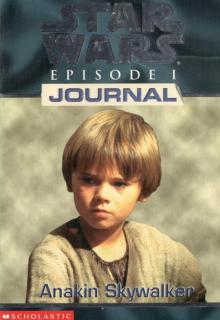 Star Wars - Episode I Journal - Anakin Skywalker
Star Wars - Episode I Journal - Anakin Skywalker